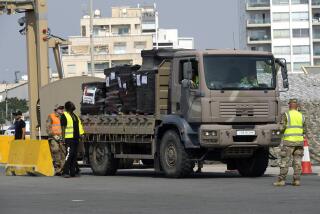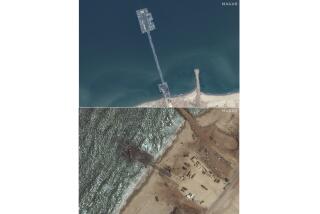In Mogadishu, Bandits Are Again Stealing Away Hope : Africa: U.N. employee says thievery is built into Somali culture. He calls it the ultimate obstacle to restoring the nation.
- Share via
MOGADISHU, Somalia — When the Sultani Hinde docked at the international seaport of this war-ruined city Tuesday afternoon, loaded to the bulwarks with sugar, rice, cooking oil, sponges and clothes, no one could have been happier than the thousands of bandits waiting eagerly outside the port’s steel gates.
Some had come from 100 miles away to loot some of the cargo that has been pouring into the Somali capital during the 11 days of tenuous peace that has prevailed here since the United Nations and the city’s fiercest faction leader, Mohammed Farah Aidid, announced unilateral cease-fires.
For Eddie Johns, who could only throw up his hands behind the relative safety of his desk inside the new Somali Ports Authority building, the scene provoked painful deja vu --and an agonizing vision of the future of Somalia.
A U.S. Army reservist called up last December to be Mogadishu’s harbor master and supervise the U.S.-led military intervention in Somalia, Johns watched the looters and bandits who ruled Somalia for more than a year disappear almost overnight when the first U.S. Marine detachments took charge of the city’s lawless streets.
Now, as a civilian U.N. employee committed personally and professionally to reconstructing the harbor into a profitable and efficient international seaport, Johns has watched the hands of time turn backward as Mogadishu again has degenerated into an unpatrolled labyrinth of clan militias and gunmen in the five months since the United Nations assumed command.
“It’s the banditry. That’s the security situation I worry about,” Johns, general manager of the port, said in an interview as teams of Somali stevedores unloaded the Dubai-based dhow.
“I’m not worried about the Aidid situation. We’re either going to negotiate with him or we’re going to give the country back to him. It’s the whole culture of kids growing up knowing no law and order, of taking what you can get, that worries me. That’ll be with us long after the Aidid problem is gone.”
In fact, the scene at the port was emblematic of the enormous tasks that lie ahead in the most ambitious U.N. mission ever--an unprecedented $1.5-billion operation that, despite having more than 29,000 troops from 28 nations, has made barely a dent in its mandate to pacify and reconstruct this nation.
Distracted and pinned down in its massive Mogadishu compound as its manhunt for Aidid became a paralyzing urban guerrilla war, the U.N. command is now faced not only with its original daunting tasks but also with repairing the damage Mogadishu’s latest war has wrought.
Briefing reporters in the Somali capital Tuesday, the U.N. special envoy to Somalia, retired U.S. Adm. Jonathan Howe, stressed that the United Nations is eager to effect those repairs, physically and politically.
“Now is the time to work for peace,” Howe said, adding that the United Nations is “still awaiting a dialogue” with sanctioned representatives of Aidid, whom Howe personally condemned as a criminal against humanity and vowed to arrest.
Howe confirmed that the United Nations on Tuesday released three of the dozens of suspected Aidid militiamen still in a U.N. detention center--a request that Aidid himself made to reporters last week. And Howe again praised the release of a Nigerian soldier and an American helicopter pilot whom Aidid’s forces had held prisoner until last Thursday.
But he indicated that none of Aidid’s top-ranking aides, who were captured by U.S. commandos in a raid last month that escalated the United Nations’ war with Aidid, will be released until after the start of negotiations with the clan leader’s Somali National Alliance.
“Clearly, if an atmosphere of confidence develops, good things are possible,” Howe said, underscoring the tentative nature of the peace prevailing in Mogadishu.
“There already are a lot of good things happening in the country,” he added, citing Baidoa, formerly a famine area where “the city of death is now the city of rebirth.”
At Mogadishu’s international seaport, however, Johns said he would just like to see a few good things in his own neighborhood--the lifeline of any future commerce that is fundamental to Mogadishu’s resurrection.
Meeting with Howe and U.N. military commanders Tuesday morning, Johns made only two requests.
“Number one, we’ve got to fix the streets,” he said. The huge craters left behind by land mines that Aidid’s forces detonated under U.N. vehicles along the road outside the port are natural barricades for looters, he explained. Trucks laden with cargo routinely are “stripped down to their chassis” when they stop at the craters.
U.S. officers at the meeting vowed that Army engineers, who have kept to their compound for months for fear of ambush, will begin the repairs today.
“The second important thing is to get the Somali police . . . out there in the streets,” Johns said. “There’s got to be a semblance of law for this thing to work.”
Since Aidid’s militiamen incurred U.N. wrath by ambushing and killing 24 Pakistani peacekeepers June 5, the United Nations has had little or no military or civilian presence on the streets of the capital. There have been few patrols. Weapons-confiscation sweeps routinely became lethal firefights, and even fortified U.N. convoys that attempted to break through crude barricades of scrap iron and wood were ambushed by Aidid’s militia.
Johns’ seaport provided ample evidence Tuesday of that costly U.N. paralysis--534 late-model Japanese cars and vans, each with large U.N. letters painted in black on the side, sat parked in useless rows, all of them stuck at the port.
There are longer-term concerns that plague the port of Johns’ dreams. Money is paramount.
The seaport’s $1.5-million operating budget covers only salaries and office equipment. Johns has no money for a new crane or forklift trucks, the backbone of a profitable port.
Despite the obstacles, Johns and his team of harbor technicians from India and Germany have rigged repairs to an ancient crane left over from Somalia’s fallen dictatorship. And he actually has managed to turn a profit, collecting more than $100,000 in port fees since he took over the port’s operations last May.
Next week, Johns will go begging, attending conferences in Geneva and Paris with potential donors who may find the money that the United Nations cannot spare for the port.
Still, it is the banditry now built deeply into Somali culture that Johns called the ultimate obstacle to restoring the nation’s place in the community of nations.
Six weeks ago, Johns witnessed it firsthand. Three Somali gunmen opened fire on his own vehicle, sending nine bullets through the windshield and doors as he drove through a local market. The bullets missed him by inches.
“They were just carjackers,” he said. “I don’t think they cared whether they killed me, but they were after the car.
“This is something that is now so deep in their society that I don’t know how you teach it out of them. I do know that the community has to stop it. You can’t put a machine gun out at every street corner. The Somalis have to be their own solution.
“Look,” he continued. “You can whack Aidid. Do whatever you want with him. But that doesn’t put an end to any of this. And this lawlessness is the real enemy.”
More to Read
Sign up for Essential California
The most important California stories and recommendations in your inbox every morning.
You may occasionally receive promotional content from the Los Angeles Times.













